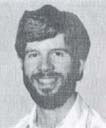Bob Hazen
(1976-77)

My experience at LIOJ has influenced my life in many ways since I left 25 years ago. I still pull out my old kanji books from time to time, pay particular attention to news from that part of the world, spend a higher percentage of my income on sushi than I might, and stay in touch with a few Japanese friends.
Most powerful for me from that time was the sense of community. We were an isolated clan of 16 or so foreigners in the midst of a mysterious land. For the most part, we were an idealistic group committed to learning about and interacting with the culture we were immersed in. That experience has shaped the nature of my friendships and the community I seek around me. It gave me a lens through which to understand, interpret and absorb the culture of Japan. As I came to understand how differently people can perceive the world, I learned to see from alternate points of view. I began to understand how culturally based our beliefs are, and thus how much ability we have to make decisions about who we are and how we act in the world.
I learned about longing and homesickness from our Thanksgiving dinners and from Steve Gramolini going into Tokyo one Saturday to find a pasta maker because he couldn't stand to go one more day without tasting fresh pasta. I have patiently, and to no avail, waited for the day at a business gathering when a Japanese businessman, trained in Western cocktail etiquette in the wee hours of one of our final parties, would attempt to gain favor by yelling out, "red rover, red rover, send Mr. Akira on over."
Some of the friendships from those days have remained strong and strengthened, and for many of the teachers I knew there, I retain a special bond, a familial tie. I've been back several times to Japan and still feel connected to Odawara, the Shibusawas, to the Harkers whom I got to know after they moved to Southern Oregon. I went to SIT after Japan in many ways because of the strong ties between LIOJ and SIT. I stopped by Portland to say hi to Sully Taylor ten years ago and decided to move here. Two years of conversations in the teacher's lounge where we looked at the world and talked of ways to have an impact upon it have surely influenced my work in non-profit management and organizational structure.
And I remember with particular fondness the office staff who were the true cross cultural trainers at the school, who made our lives so much easier and gently showed us the way to get things done in Japan.
June 2002
Top |
Copyright (c) Language Institute of Japan (LIOJ) / 日本外語教育研究所 |  Back Back |